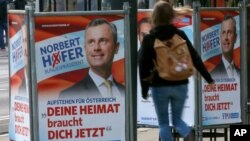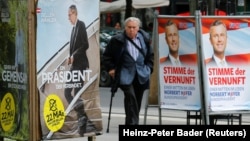In the fall of 2015, the international news was flooded with pictures of an Austrian train station where volunteers welcomed refugees with food, clothing and games for children.
Almost a year later, the train station now welcomes commuters and tourists. Media coverage focuses on a growing anti-immigration political movement poised to take another crack at the Austrian presidency.
At a quiet park in Vienna, Jesse de Pagter, a 23-year-old philosophy student from the Netherlands, said the outpouring of sympathy for refugees may have been a catalyst for an outpouring of intolerance.
“It may have been the positive image that made the contrary true,” he said. “It’s an image of a divided country.”
On Friday, an Austrian court canceled the results of the country’s May presidential elections, citing widespread rule breaking. The re-vote, scheduled for the fall, essentially gives Austria’s Freedom Party candidate, Norbert Hofer, another chance at becoming the European Union’s first far-right head of state.
In central Vienna, a city that has consistently - and uniquely within Austria - voted against the Freedom Party. Henrik Neumayer, 17, has had a vote since he was 16-years-old. When asked who he supported in the upcoming election, he winced like he has just swallowed a rotten egg. “Ehh, I think I don’t like either of them,” he said.
At his side, on the park bench by a serene duck pond, 16-year-old Sara Maksim is more certain. As far as she is concerned, Hofer is a racist, campaigning on impractical anti-immigrant policies. “I think he just wants a second chance to get elected.I hate him,” she said.
“Van der Bellen?” then says Neumayer, speaking of 72-year-old recently rescinded president-elect, the Green Party’s Alexander Van der Bellen. He is a former economics professor who supports gay rights and open borders, winning the overturned election by about 1 percent of the vote. “Actually I don’t know what he wants.”
Maksim pondered momentarily and laughed. “I don’t know what he wants either. But Hofer, no. Just no,” she said.
Hofer is a 45-year-old trained aviation engineer often called the “friendly face” of the far right party and known for describing his staunch anti-immigrant policies in more moderate language than his party's leadership.
“I think [Hofer] somehow wants to unite our country. But I don’t think he can do it,” said Neumayer.
Beyond Austria
At bench near the park exit, de Pagter from the Netherlands and his friend, 22-year-old Italian Damiano Ranzanigo, also a philosophy student in Vienna, rest after a night on the town. The university is closed for the summer.
They may not be able to vote in the upcoming election, but they said that the consequences of a Freedom Party win for their countries could be, in their view, terrible.
“It’s a very bad sign because it makes the rhetoric in other countries stronger,” said de Pagter. Nationalist, and specifically anti-Islamic, political movements have been growing steadily across the continent and in the United States since the Paris attacks last November. “You just need a few other terrorist attacks and they will become more severe,” de Pagter added.
A victory for the Freedom Party could empower these movements as they seek to gain political power, despite the fact that the Austrian presidency is largely considered a symbolic office. Also, Austria is expected hold parliamentary elections within the next two and a half years, a vote that could be influenced by the success or failure of the growing right.
“There are a lot of people taking them seriously,” said Ranzanigo, speaking of European right-wing parties in general. Besides having more concrete plans, right-wing parties nowadays don’t sound as extreme as their predecessors, making them palatable to a larger audience.
“They are always trying to stay politically correct. They don’t want to be called xenophobic,” he said.
In a nearby grassy field, two brothers - both refugees from Syria - are reluctant to talk about the upcoming elections, or the uncertain future they face after fleeing a gruesome war to a country that was once more welcoming.
“It could be a catastrophe,” said one brother before walking away. “But it’s not for us to decide.”
Correction: An earlier draft of this article said an Australian court overturned the results. It was an Austrian court. VOA regrets the error.







